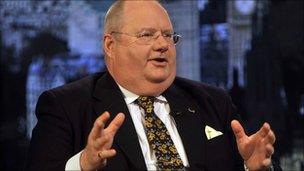Eric Pickles' office warned No 10 on benefits cap plan
- Published

The letter was sent from the office of Communities Secretary Eric Pickles
A government department warned Downing Street that plans to cap benefits could result in 20,000 people in the UK being made homeless, it has emerged.
A letter from the office of Communities Secretary Eric Pickles in January said this meant the proposed £500-a-week cap could cost more than it saved.
The letter said other benefit changes could uproot a further 20,000 people.
Mr Pickles' spokesman said he fully supported government policies but Labour said this was not "good enough".
Plans for a maximum limit on the amount of benefits one family can claim a year from 2013 - of about £26,000 - were announced at the Conservative conference last October.
It is estimated the cap, which would apply to the combined income from benefits such as jobseekers allowance, housing benefit and council tax benefit, could result in about 50,000 families being about £93 a week worse off.
'Serious issues'
A Whitehall source told the BBC that Mr Pickles had not written the letter in question - leaked to the Observer, external - himself and had never raised the issues with cabinet colleagues.
The letter said the Department for Communities and Local Government supported the principle of the benefits cap "on the grounds of fairness" because it was "not right that a household on benefit should receive more than the average working household".
But it said the cap could cause some "very serious practical issues" because thousands of families would be unable to pay their rent.
"Our modelling indicates that we could see an additional 20,000 homelessness acceptances as a result of the total benefit cap," it said.
"This on top of the 20,000 additional acceptances already anticipated as a result of other changes to housing benefit."
It outlined concerns that an estimated £270m a year in savings from the measure did not take into account the additional costs to local authorities through homelessness and temporary accommodation.
"In fact we think it is likely that the policy as it stands will generate a net cost," the letter stated.
And it said the department was worried that the policy may reduce by more than a third the amount of new social housing available for families.
"To fund new affordable housing development providers need to be able to charge rents of up to 80% of the market levels but the impact of the overall benefit cap will prevent them from doing so in many areas greatly reducing their financial capacity," it said.
'Houses at risk'
The letter was written by Mr Pickles' private secretary Nico Heslop and sent to Prime Minister David Cameron's private secretary Matthew Style.
A spokesman for Mr Pickles said: "We are fully supportive of all the government's policies on benefits. Clearly action is needed to tackle the housing benefit bill which has spiralled to £21bn a year under Labour."
Labour have said they will put down an urgent question on the issue in Parliament on Monday morning, saying one arm of government does "not know what the other is doing".
"It is simply not good enough when 40,000 families have their houses at risk," shadow work and pensions Secretary Liam Byrne told the BBC.
Mr Byrne said the letter appeared to contradict claims ministers had made to Parliament that they could not calculate the number of families likely to be affected by the changes.
"There are some very serious questions ministers need to answer over the next week about whether they have been straight with the country over the impact of their welfare changes," he added.
The opposition have said they would support the idea, in principle, of a cap on total benefit payouts while giving no details of what level it should be set at.
Housing charity Shelter said it was "naive" for ministers to think they could cut the housing benefit bill without people being uprooted.
"Even if we manage to catch people, they will still be moving from their homes and communities," spokeswoman Kay Boycott said. "If they end up homeless, it will cost more than it will save."
- Published31 March 2011
- Published20 June 2011
- Published13 June 2011
- Published13 June 2011